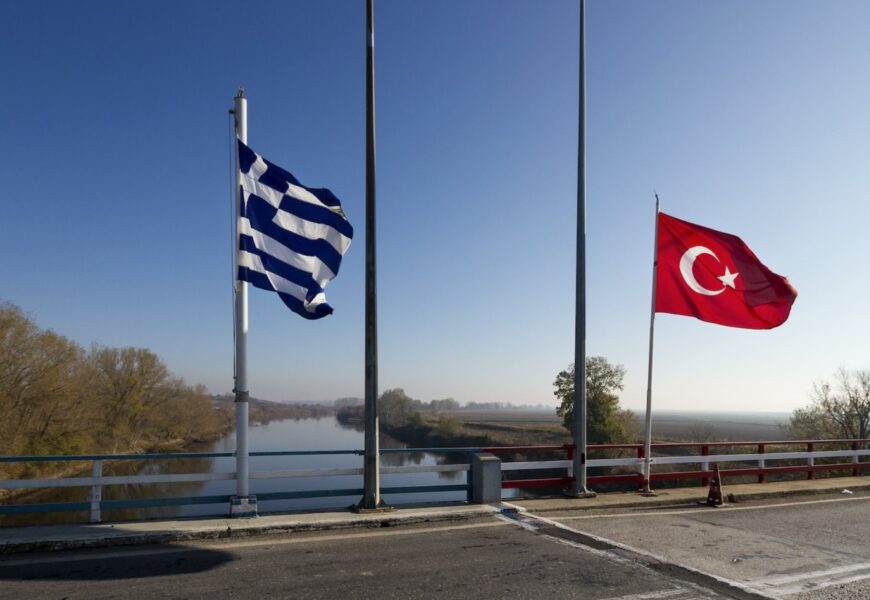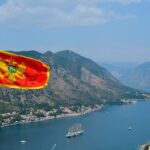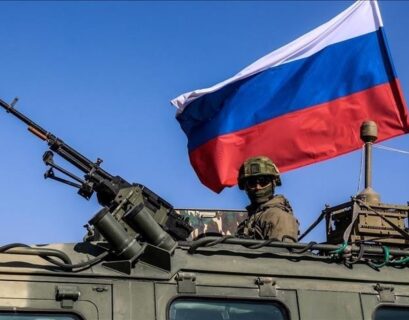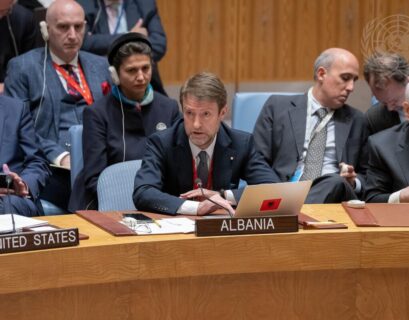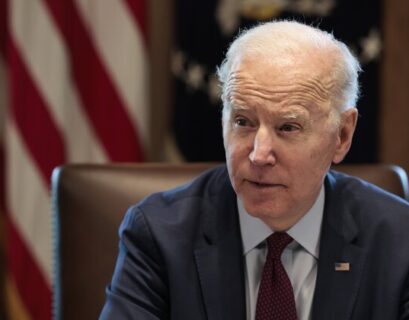BLENDI LAMI
Old rivalries come to light
It is estimated that two billion barrels of oil and four trillion cubic meters of natural gas are found in the seabed of Eastern Mediterranean. Such a discovery rekindled old rivalries and set the stage for a geopolitical clash.
In January 2019, Israel, Egypt, Italy, Greece and Jordan created a consortium to look for oil and gas in the region, but Turkey was not included. So Turkey decided to send its own drilling ship to the Mediterranean in May 2019, and began seismic surveys and exploration drilling along the north coast of Cyprus. Turkey calls this deal void and null, saying that this area lies within its continental shelf.
Unilaterally, Turkey decided to claim its stake via diplomatic means, using other mechanisms, and in November 2019, signed a maritime agreement with Libya. Through this agreement both countries expanded their Exclusive Economic Zone, and Turkey gained exclusive rights to fish, drill and carry out economic activities. According to Turkey, this deal ensured that there will not be any Eastern Mediterranean energy settlement, without Ankara taking place at the negotiating table.
Unilaterally, Greece and Cyprus also claims that the north of Cyprus (Turkish Republic of Northern Cyprus) is part of Republic of Cyprus, and that this area is above its continental shelf so they have the rights to any potential to oil and gas and drilling activities.
The oil issue gave rise to other problems in the region like the status of the islands that should remain demilitarized. These maritime issues are unique for this geography of the region, as there are many Greek islands very close to Turkish mainland. From the security standpoint, Turkey is very concerned. Turkish provocation goes on with the exploration in these waters. Greek provocation goes on with the sending of troupes in the island of Kastellorizo – only two kilometres away from the Turkish southern coast.
In this hot geopolitical climate, Greece declares that it will extend its territorial waters from 6 to 12 miles, citing that this is in line with international sea conventions, while Turkey argues that the special geographical properties of the Aegean Sea make the application of 12 miles rule problematic.[1]
This move affects also the territorial waters between Greece and Albania in the Ionian Sea. Greek PM Mitsotakis said Greece would exercise an “inalienable sovereign right” in line with Article 3 of the Convention on the Law of the Sea, and could in the future extend its territorial waters in other maritime areas, in accordance with the Convention on the Law of the Sea”. [2]
Regarding Greek extension to the Aegean, Turkey has warned that a similar move by Greece to the east would be a “casus belli” – a cause for war, as it considers a territorial grab. On another part of the Mediterranean, Albania reacts softly as small and weak states usually do – trying to be peaceful. Albanian PM Edi Rama declared that Greece has the right to so, based on an international convention of 1982.[3] Ksenofon Krisafi underlined: “It is absurd . . . to believe that Greece will expand the range of its territorial waters from the coast of Corfu to Saranda to 12 nautical miles. First, there is not enough space for this width. Second, under the Convention on the Law of the Sea, Albania has this right to the same degree”.[4] But in this case it is not simply logic and convention; it is more a geopolitical power play.
In this theatre, Turkey aims to consolidate its profile as a regional power, Greece aims to establish its status as a state that can be imposed and is part of strong alliances, while Albania is trying to play a kind of diplomacy of appeasement.
The new geopolitical game
While Turkey and Greece are on the brink of war in the Eastern Mediterranean, Albanian government seems confused and uninformed, as it finds itself in “unchartered waters”. Turkey and Greece will try to reach two major goals: exploit the energy resources for their economic benefits, and showing their respective power. Albania will need to clarify its strategy. Reference to conventions and creation of skilful negotiating team are not sufficient elements to efficiently get involved as an active player in the current complicated international environment, because the geopolitics of the Eastern Mediterranean is being deeply transformed.
The Eastern Mediterranean security environment today is defined by energy discoveries, new (im)balances of power, and increased interest in the area from external powers. [5]
First, the discovery of energy resources is among the main drivers of the changing geopolitical and security dynamics in the region, which has prompted the reconfiguration of the strategic calculations of countries such as Turkey and Greece, but also the involvement of other players such as France, Italy, Egypt, Libya and Israel.
A country like Albania must understand that oil is a weapon in foreign policy to impose objectives to others. Beyond conventions, the geo-economic importance of the Economic Exclusive Zones, the geographical position and the sound alliances should be considered on the basis of circumstances, as the Mediterranean area is creating ongoing uncertainty, which is affecting interstate relations in different ways.
Second, in the Mediterranean there is a new balance of power. As stated above, old rivalries have come up, as Turkey is facing a bloc of countries such as Cyprus, Greece, Israel and Egypt. Like never before, such escalation is spiralling into a multinational conflict. France has joined this anti-Turkish block, as it dispatched warships to the contested waters. Another area in the Mediterranean where the rivals are colliding is Libya: France and Egypt are already in open conflict with Turkey. Observers fear that any further escalation in the Eastern Mediterranean could set off a Euro-Middle Eastern maelstrom.[6]
The Albanian policymakers must be aware that the Mediterranean is no longer an area controlled by the West. Over the Obama years, the US significantly retreated from the Middle East, and president Trump has frequently declared that US is going to focus more on home affairs – despite a commitment to enhance military power. American retreat made way for the Russian penetration in the region. After intervening successfully in the Syrian civil war, Russian eastern Mediterranean naval presence is growing. In addition, Turkey has not been deterred from pursuing its own goals and claims.
Third, there is an increased interest in the area from external powers. Apart from US and Russia, the European Union is highly interested in Eastern Mediterranean developments particularly regarding the energy domain. France and Italy have been trying to get more involved in the region’s affairs. China, too, has recently developed a keen interest in the Eastern Mediterranean within the framework of its ambitious Belt and Road Initiative (BRI). The antagonism among those rivals and the resulting geopolitical bargaining will have a significant impact on national foreign policies in the Eastern Mediterranean.
European Union deserves special attention in this context. Germany has appealed for de-escalation of tension in the eastern Mediterranean between NATO allies Greece and Turkey, warning that “a spark could lead to a disaster”.[7] From all geopolitical actors, Germany would be the most impartial mediator. It is very likely that Germany will fill America’s vacuum. Security in the Mediterranean directly affects the European security architecture. It is in the EU’s interest to guarantee co-operation between Turkey and Greece. This may also include the problem arising from the flow of migrant through Turkey towards European capitals. So, at a time of declining American commitment to the management and resolution of regional security crises in the region, it would benefit the European Union to play such a role.
Albania in two geopolitical scenarios: “World of Regions” and “G-Subzero”
To have a clearer geopolitical picture of this conflict, we can refer to the scenarios predicted by Ian Bremmer. In Every Nation for Itself: Winners and Losers in a G-Zero World, Ian Bremmer predicts five scenarios for the future international relations: G2—a U.S.-Chinese partnership; Concert—a G 20 that actually works; Cold War 2.0—or something worse; a World of Regions—to each his own; and Scenario X—the G-subzero.[8]
The Greek – Turkish conflict is being played in the theatre of “world of regions”. The European Union seems unable to resolve such a crisis as it is challenged by Turkey. The US is being withdrawn from the region and for many security problems declares that these are European problems. In this leaderless world, “there is growing power vacuum in international politics as no country or group of countries has the political and economic leverage to drive an international agenda or provide global public goods”.[9] It is very likely that in this scenario the pivot states will be even more successful. The lack of multilateral agreements will enable them to seize opportunities to conclude bilateral agreements with other countries.
An essential feature of this system is unilateralism, which essentially means unilateral action without reference to conventions or without respect for multinational institutions. In the geopolitical game of the Eastern Mediterranean, the dominant power is Turkey. Greece, on the other hand, in a defensive position, also tends to impose itself, as it makes alliances with other powers such as France and Italy. In this fragmented environment, important institutions are not intervening to resolve the crisis.
According to Bremmer, emerging states like Turkey are certainly poised to take advantage of new opportunities to play a more prominent diplomatic role in this new order. Turkey – as a regional heavyweight – will try to benefit, as few international rules and regulations are enforceable. Being at the crossroads of Europe, Asia, the Middle East, and the former Soviet Union make Turkey the very model of a pivot state.[10]
There are also factors contributing to Greece being a pivot state, as it has alternatives. The overarching strategic goal of the Greek foreign policy is to minimize the risks and maximize the opportunities arising from its geopolitical position. [11] Greece is building various alliances to find its place in this new order: member of NATO and EU, good relations with Russia, cooperation with China etc. These are advantages that render Greece a pivotal state in the Eastern Mediterranean.
In the perspective of this possible conflict, Albania – lacking many of the advantages enjoyed by a pivot state – faces two major challenges.
First, Albania should clarify its position toward the Greece-Turkey clash. It has not done so, because it has to take a stand on Northern Cyprus, revise cooperation with Turkey and Greece (currently both strategic regional partners of Albania[12]), or even define its role within the European Union. But Albania tends to hide behind multilateralism. This approach cannot last for long. The second, and even more important, challenge is the imposing capability on Greece in resolving the stalemate. Albania refers to conventions and relies on international institutions, but in the “world of regions” such initiatives are half-baked.
Moreover, in the “world of regions”, a more powerful state – in this case Greece in relation to Albania – may not act in accordance to international rules. Non-implementation of international law is a widespread phenomenon nowadays. (This is clearly evidenced in the Eastern Mediterranean – by both Greece and Turkey.) And in the event of the failure of multilateralism, further deterioration of the “world of regions” might lead to the fifth Bremmer scenario: a very different kind of fragmentation of the international order plagued by anarchy: G-sub-zero world. This scenario has a lower probability to materialize, but Albania seems completely unprepared to face it.
BLENDI LAMI is a lecturer at the Faculty of Political Sciences and International Relations, European University of Tirana. His research interests include foreign policy, geopolitics and security. In pursuing these interests, he has been involved in several research projects, has published numerous articles and has participated in many scientific conferences in Albania and abroad.
[1]https://www.trtworld.com/video/social-videos/the-turkey-greece-mediterranean-dispute explained/5f5790263e5d6b001712b13c
[2] https://www.ekathimerini.com/256247/article/ekathimerini/news/greece-to-extend-territorial-waters-in-ionian-sea-to-12-miles-says-pm
[3]https://euronews.al/en/albania/2020/08/31/albanian-president-asks-government-for-more-information-on-greek-pm-declaration-regarding-maritime-border
[4] https://balkaneu.com/albania-there-is-no-need-to-worry-for-the-12-mile-extension-in-the-ionian-according-to-professor-krisafi/
[5] Zenonas Tziarras, 2019, The new geopolitics of the Eastern Mediterranean trilateral partnerships and regional security. Peace Research institute Oslo.
[6] https://foreignpolicy.com/2020/08/18/eastern-mediterranean-greece-turkey-warship-geopolitical-showdown/
[7]https://www.aljazeera.com/news/2020/08/german-fm-spark-lead-disaster-east-mediterranean-200825141815909.html
[8] Ian Bremmer. Every nation for itself: winners and losers in a G-zero world (New York: Penguin Group, 2012)
[9] Ibid
[10] Ibid
[11] https://gkoumoutsakos.gr/en/greece-s-geopolitical-added-value-as-a-basis-for-its-foreign-policy-a-strategic-and-institutional-overview/
[12]https://www.trt.net.tr/shqip/ballkani/2019/01/18/rama-kerkon-thellimin-e-bashkepunimit-ne-trekendeshin-e-partneritetit-turqi-greqi-itali-1128259


